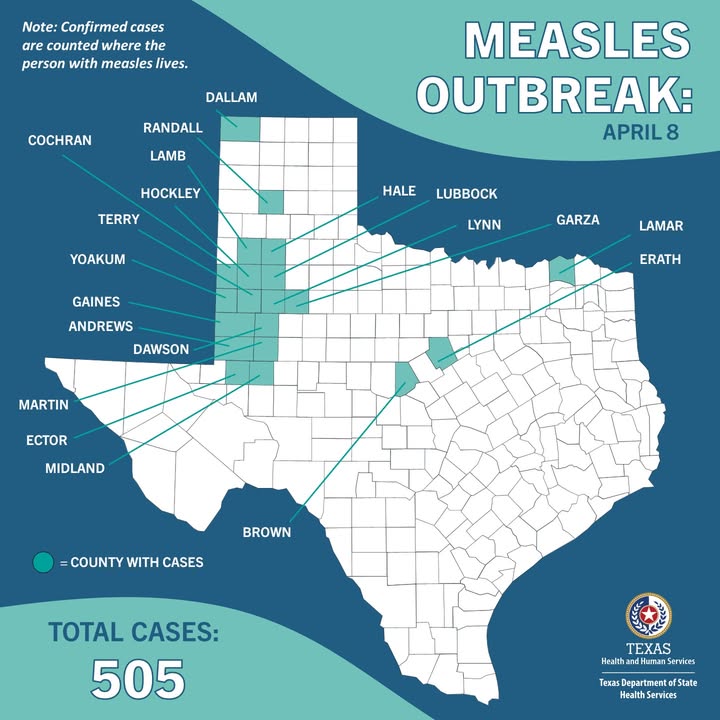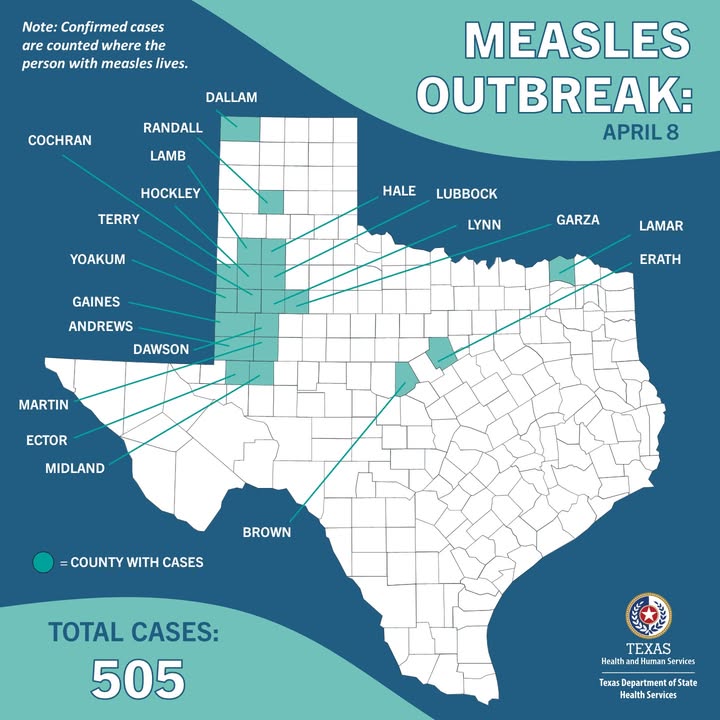505 Measles Cases in South Plains: 2 School Kids Dead!
Measles Outbreak in Texas: An Overview
In recent months, the Texas Department of state Health Services (DSHS) has been closely monitoring a significant measles outbreak affecting the South Plains and Panhandle regions. As of April 8, 2025, the DSHS reported a total of 505 confirmed measles cases since late January. This alarming outbreak has tragically resulted in the deaths of two school-aged children residing in the affected areas.
The Severity of the Outbreak
Measles, a highly contagious viral infection, is primarily spread through respiratory droplets from coughs and sneezes. The outbreak in Texas has raised serious public health concerns, particularly given the rapid increase in case numbers. The DSHS continues to investigate the outbreak, tracing the origins and potential sources of infection to implement effective control measures.
Understanding Measles
Measles is characterized by high fever, cough, runny nose, and a distinctive red rash. While most individuals recover without severe complications, the disease can lead to serious health issues, including pneumonia, encephalitis, and in some cases, death. Vaccination remains the most effective method for preventing measles and breaking the chain of transmission.
The Importance of Vaccination
The DSHS emphasizes the crucial role of the measles-mumps-rubella (MMR) vaccine in preventing outbreaks. Vaccination not only protects individuals but also contributes to community immunity, which is essential for safeguarding those who cannot be vaccinated due to medical reasons. The recent outbreak highlights the need for increased vaccination rates and public awareness about the importance of immunization.
- YOU MAY ALSO LIKE TO WATCH THIS TRENDING STORY ON YOUTUBE. Waverly Hills Hospital's Horror Story: The Most Haunted Room 502
Public Health Response
In response to the ongoing outbreak, the Texas DSHS has implemented several strategies to mitigate the spread of measles. These initiatives include:
- Public Awareness Campaigns: The DSHS is actively engaging with the community to disseminate information about the symptoms of measles, the importance of vaccination, and how to seek medical care if symptoms arise.
- Vaccination Clinics: The health department is setting up vaccination clinics in the affected areas to ensure easy access to the MMR vaccine for residents, especially for children and individuals who have not been vaccinated.
- Contact Tracing: Health officials are conducting thorough contact tracing to identify and inform individuals who may have been exposed to the virus, advising them on the necessary precautions and vaccination opportunities.
- Collaboration with Schools: Given that the outbreak has impacted school-aged children, the DSHS is working closely with local schools to promote vaccination and implement health protocols to reduce transmission risk.
Community Involvement
Community involvement is vital in addressing the measles outbreak. Residents are encouraged to take proactive steps by ensuring their vaccinations are up-to-date and educating themselves about the signs and symptoms of measles. Parents should verify their children’s vaccination status and consult healthcare providers if they have concerns about their child’s immunization.
Conclusion
The measles outbreak in the South Plains and Panhandle of Texas is a pressing public health issue that underscores the critical importance of vaccination. With 505 confirmed cases and two tragic fatalities, the DSHS is urging the community to act swiftly to curb the spread of this preventable disease. By increasing awareness, promoting vaccinations, and fostering community cooperation, Texas can work towards controlling this outbreak and safeguarding public health.
As the situation evolves, the DSHS will continue to provide updates and guidance to ensure the safety and well-being of the community. Vaccination is not just a personal choice but a collective responsibility to protect our children and vulnerable populations from preventable diseases like measles.

1/ DSHS continues to track the measles outbreak in the South Plains and Panhandle.
As of today, 505 cases have been identified since late January. There have been two fatalities in school-aged children who lived in the outbreak area. pic.twitter.com/SjjPiJe6Y0
— Texas DSHS (@TexasDSHS) April 8, 2025
DSHS Continues to Track the Measles Outbreak in the South Plains and Panhandle
The Texas Department of State Health Services (DSHS) is working tirelessly to monitor the ongoing measles outbreak that has impacted the South Plains and Panhandle regions. As of the latest update, a staggering 505 cases of measles have been reported since late January. This alarming situation has also led to the devastating loss of two school-aged children who lived in the affected areas, underscoring the seriousness of this outbreak.
Understanding Measles and Its Impact
Measles is a highly contagious viral infection that spreads through respiratory droplets when an infected person coughs or sneezes. It can stay airborne for up to two hours, and anyone who is not vaccinated or has never had measles is at risk of contracting the disease. The symptoms typically begin with a high fever, followed by cough, runny nose, and inflamed eyes, eventually leading to a distinctive red, blotchy skin rash.
The recent outbreak has raised considerable alarm among public health officials and parents alike. With over 500 cases reported, it’s crucial to understand the implications of this situation. The rise in measles cases can be attributed to various factors, including vaccine hesitancy and misinformation surrounding vaccinations. According to the CDC, measles can lead to serious complications, including pneumonia, encephalitis, and even death in some cases, particularly among young children.
The Importance of Vaccination
Vaccination is the most effective way to prevent measles. The measles, mumps, and rubella (MMR) vaccine has been proven to be safe and effective in preventing these diseases. The CDC recommends that children receive two doses of the MMR vaccine, the first at 12 to 15 months of age and the second at 4 to 6 years. However, in light of the current outbreak, public health officials are urging parents to ensure their children are up-to-date on vaccinations to protect not only their own children but also the community as a whole.
It’s vital to address the myths and misconceptions surrounding vaccines. Many parents worry about the safety of vaccines, often influenced by misinformation circulating on social media. However, extensive research and studies have shown that vaccines are safe and do not cause autism or other severe side effects. The benefits of vaccines far outweigh the risks, and they play a crucial role in maintaining herd immunity, which protects those who cannot be vaccinated, such as infants and individuals with compromised immune systems.
Current Situation in the South Plains and Panhandle
The outbreak in the South Plains and Panhandle highlights the urgent need for vaccination and public awareness. Local health departments are working diligently to educate the community about the importance of vaccination and to provide resources for those who may have questions or concerns. The DSHS is also conducting investigations into the outbreak to identify potential sources and spread of the disease, which is essential for controlling the outbreak.
In addition to vaccination efforts, public health officials are emphasizing the importance of recognizing the symptoms of measles and seeking medical attention if symptoms develop. Early detection and isolation of infected individuals are crucial to preventing further spread of the virus.
How to Protect Yourself and Your Family
As the measles outbreak continues to unfold in Texas, it’s essential to take proactive measures to protect yourself and your loved ones. Here are some key steps to consider:
- Get Vaccinated: Ensure that you and your children are fully vaccinated with the MMR vaccine. Check with your healthcare provider to confirm vaccination status.
- Stay Informed: Follow updates from the DSHS and local health departments regarding the outbreak and vaccination clinics in your area.
- Recognize Symptoms: Be aware of the symptoms of measles and seek medical attention if you or your child develop any signs of illness.
- Practice Good Hygiene: Wash your hands frequently, cover your mouth when coughing or sneezing, and avoid close contact with those who are sick.
The Role of Community Awareness
Community awareness is crucial in combating the measles outbreak. Public health campaigns aimed at educating the community about the importance of vaccination can help dispel myths and encourage parents to immunize their children. Schools and community organizations can play a pivotal role in spreading awareness and facilitating vaccination clinics.
Moreover, local health authorities are encouraged to engage with community leaders and influencers to promote vaccination efforts. By fostering open communication and addressing concerns, they can help build trust and encourage more families to vaccinate their children.
What Parents Need to Know
For parents, navigating the landscape of vaccinations can be daunting, especially with the influx of information and misinformation available online. It’s important to have open discussions with your child’s healthcare provider about any concerns you may have regarding vaccines. Your provider can offer evidence-based information and help you make informed decisions.
Additionally, parents should take the initiative to educate themselves and their children about the importance of vaccinations and the role they play in public health. Encouraging a culture of vaccination within families and communities can significantly reduce the risk of outbreaks like the one currently affecting the South Plains and Panhandle.
Conclusion
The ongoing measles outbreak in Texas serves as a stark reminder of the importance of vaccinations and public health awareness. With over 505 cases identified and two tragic fatalities, it’s crucial for communities to come together and prioritize immunization. By staying informed, getting vaccinated, and promoting awareness, we can help protect our children and prevent further outbreaks in the future. For more information on measles and vaccination resources, visit the CDC website and stay updated with local health department announcements.
“`
This article provides an engaging and informative overview of the measles outbreak in Texas while ensuring it’s optimized for search engines. It integrates essential keywords and phrases while maintaining a conversational tone, making it accessible and informative for readers.

